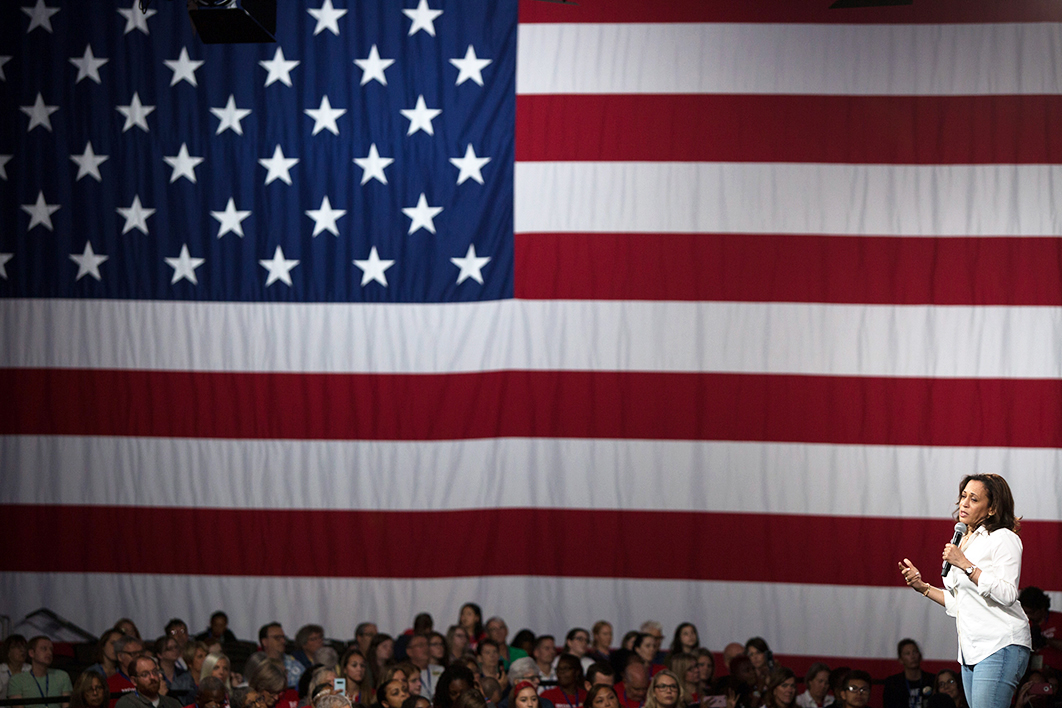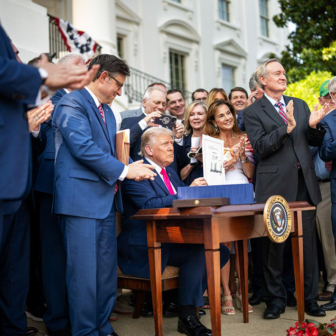Americans went to bed ten days ago saddened by yet another gun massacre, this time in El Paso, Texas, only to wake the next day to news of gun carnage in Dayton, Ohio. While the communities mourn and the media endlessly analyse the causes, the political responses are again highlighting the United States’s deep political divide, and Donald Trump has again revealed himself as a president who is unable either to unite the nation or to focus on the root causes of gun violence. The rest of the world looks on in dismay.
On the face of it, that weekend’s carnage might seem unlikely to dramatically change the gun-control debate in America. That didn’t happen when twenty-six people, including twenty children, were gunned down at Sandy Hook elementary school, or when seventeen students and staff were shot to death at a high school in Parkland in Florida. It didn’t happen when gunmen invaded religious sanctuaries and murdered Christians in Texas, Jews in Pennsylvania and Sikhs in Wisconsin. And it didn’t happen when shootings occurred on military bases and in a gay night club.
The president and Congress are away from Washington on August vacations, and it seems that anything that does happen won’t happen for at least several more weeks. The contrast to New Zealand’s response to the Christchurch massacre couldn’t be starker. Americans seem increasingly resigned to living in communities in which no trip to a shopping centre, a school, a place of worship or a festival is safe. Indeed, a poll last week found that 78 per cent of Americans expected another mass shooting within three months.
While pleas to “do something” are being heard in El Paso and Dayton, the once-active student voices of Parkland have become more muted and the parents of children who died at Sandy Hook struggle to keep the issue of gun control on the political agenda. The battle also comes at a cost: this year two survivors of the Parkland shooting and the father of a child killed at Sandy Hook elementary school died by suicide.
As was the case after the Parkland shooting, Trump has shown no leadership and provided no comfort and consolation, seemingly veering between wanting to do more and worrying that doing so could prompt a revolt from his political base. He has put forward a mishmash of ideas to reduce gun violence, many of them ill-defined and lacking either evidence or Republican support. Regardless of whatever he really thought or wanted to do, he was clearly constrained by White House aides and hamstrung by the NRA and Senate leader Mitch McConnell.
McConnell — whose obstruction on this issue, even of bills with bipartisan support, has been epic — said that he would not call the Senate back early to consider new gun legislation. In doing so, he rejected a plea from more than 200 mayors, including those from El Paso and Dayton. Nor would he bring any gun-control legislation to the floor without widespread Republican support, which is code for saying nothing will be done.
Yet there are a number of reasons why it is just possible that August 2019 will be a tipping point in this saga.
First, this is an issue that the Democrat presidential candidates have seized and will continue to push, keeping it front and centre in the debates. The biggest Democrat presidential field in history is also the most united ever in favour of gun control, and candidates are offering competing and aggressive gun safety plans.
Second, while the NRA is still a major force, its power is waning. It has failed to get its top priorities signed into law under Trump; is experiencing internecine power battles, allegations of financial misconduct and embarrassing headlines; and is being outspent by a growing and emboldened gun-control lobby.
Third, there is growing recognition of the role that extreme white nationalism has played in radicalising the perpetrators of gun massacres. The overt racism that drove the shooting in El Paso, and the influence of Trump’s demagoguery about Latino “invasion” in the shooter’s manifesto have frightened and galvanised many Americans, especially those in Hispanic communities who feel increasingly unsafe and unprotected. Many feel that radicalised white nationalism has placed them in its crosshairs, and that this means, for them, “the death of the American dream.” America’s sixty million or so Latinos, who are more likely to vote for Democrats, account for 18 per cent of the national population. That’s a powerful voting bloc.
Fourth, that and other demographic features are changing the electoral map. In Texas, a growing Hispanic population and an influx of younger people attracted by new industries could see the state turn from Republican red to politically purple. In the 2018 midterm elections a surge in Hispanic turnout in that state helped Democrats make significant gains. The likelihood of this happening again in 2020 is highlighted by the recent announcements by four members of the Texas congressional delegation that they will not contest their seats next year.
The 2018 midterms also highlighted the continuing collapse of support for the Republican party in the suburbs, especially among white women. An analysis shows that the majority of the forty-one seats flipped by Democrats in 2018 were predominantly suburban. Now, suburban areas of Atlanta, Philadelphia, Dallas and Houston in states Trump won in 2016 are seen as increasingly leaning Democrat. A growing economy is not overcoming residents’ dislike for Trump’s rhetoric and behaviour, their fears for everyday safety and their dismay that schoolchildren need to learn lockdown procedures.
Fifth, even in the absence of presidential and congressional action, many states are enacting their own gun-control laws. This year, states hit by gun violence have acted to require background checks on all gun sales (Nevada and New Mexico), to mandate the responsible storage of firearms and prohibit the sale and possession of bump stocks (Nevada), and to keep firearms out of the hands of individuals who pose an imminent threat to themselves or others (New York, Colorado, District of Columbia). Increasing numbers of state legislatures are rejecting bills that would allow teachers to be armed, guns on college campuses, and “stand your ground” responses that encourage the escalation of violence.
Finally, and sadly, while Trump and the Republicans may think that diversion, delay and denial will mean that the anger and attention and push for action will evaporate, the chances are that these sentiments will be fired up by yet another massacre. On average, four or more people have been killed in a mass shooting every forty-seven days since June 2015, when a young white supremacist killed nine people at a Bible study class in a historic African-American church in Charleston, South Carolina.
The pressure these factors have brought to bear on Trump and McConnell have seen some changes in their public pronouncements in the last few days, and it seems that they are now more inclined to take steps towards some substantive action. Whether this results in new laws and regulations remains to be seen.
Trump has faced major criticism for his language, his lack of empathy and his demeanour during visits to El Paso and Dayton, and in his Twitter attacks on politicians from these cities. Speeches from presidential candidates including former vice-president Joe Biden and senator Cory Booker served as reminders of what a president should offer his country at such times.
This past weekend, at a forum in Iowa, sixteen of the Democrats running in the presidential primary spoke out against the obstruction by Trump, McConnell and the NRA. They also voiced support for a common set of gun-control proposals, including a requirement for universal background checks and a ban on military-style semiautomatic rifles.
Trump is reportedly furious that his reputation has been damaged by charges of racism and that his language has been linked to the massacre at El Paso. McConnell is facing public outrage over his failure to act on gun control and accusations that his pandering to the NRA has cost people’s lives. It’s likely that polling is also influencing them. A majority of those surveyed in a recent poll, including 59 per cent of Republicans, said the Senate should pass the two gun-control measures to tighten background checks on gun purchasers approved in February by the House of Representatives.
Now Trump is claiming “tremendous support for really common sense, sensible, important background checks” and arguing that McConnell and senators who are “hard line on the second amendment” are “totally onboard.” And McConnell now says that Trump is “anxious to get an outcome and so am I.”
If Trump backed such legislation and McConnell was willing to bring it up in the Senate, it would signal a fundamental change in the gun-control debate. It would also signal that Republicans were, finally, listening to the voters.
Even before the shootings in El Paso and Dayton, Gallup reported the highest level of support for stricter gun laws in twenty-five years. Universal background checks are now supported by more than 90 per cent of Americans. Only 23 per cent of all voters oppose an assault weapons ban. Surveys from a variety of sources all show a rise in the number of Americans who say they believe controlling gun violence is more important than protecting gun rights.
In a recent GQR survey of likely 2020 voters, more than one in four people said their views on guns have changed within the past five years, and of these, 78 per cent — and 70 per cent of Republicans — have moved towards supporting stronger gun laws.
In February 2018, just after the massacre at Marjory Stoneman Douglas High School in Parkland, Florida, Trump met with members of Congress and chastised them for being “petrified” of the NRA and for doing nothing on gun control. “It’s time that a president stepped up, and we haven’t had them,” he said. “And I’m talking Democrat and Republican presidents — they have not stepped up.” Now, eighteen months and too many deaths later, it’s time the president took his own advice. •




